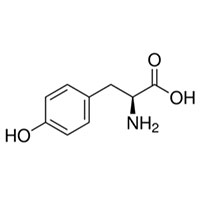



| N/A |
| Packing | |
|---|---|
| Storage | Powder -20°C 3 years 4°C 2 years;In solvent -80°C 6 months, -20°C 1 month |
| Shipping | Room temperature in continental US; may vary elsewhere |
Tel: 0086-25-52397805
Email: info@alchemist-chem.com

| Common Names | L-Tyrosine | ||
|---|---|---|---|
| Structure |  |
||
| CAS No. | 60-18-4 | Boiling Point (℃) | 385.2±32.0 °C at 760 mmHg |
| Molecular Weight | 181.189 | Melting Point (℃) | >300 °C (dec.)(lit.) |
| Density | 1.3±0.1 g/cm3 | Vapor Specific Gravity | N/A |
| Molecular Formula | C9H11NO3 | Flash Point (℃) | 186.7±25.1 °C |
| Solubility | 0.45 g/L (25 ºC) | Autoignition Temperature (℃) | N/A |
| Personal Protective Equipment | Eyeshields;Gloves;type N95 (US);type P1 (EN143) respirator filter | ||
|---|---|---|---|
| Hazard Codes | T+:Very toxic | ||
| Safety Phrases | S1-S28-S45 | ||
| RIDADR | NONH for all modes of transport | ||
| WGK Germany | 3 | ||
| SYMPTOMS | PREVENTION | FIRST AID | |
| Inhalation | Cough. Sore throat. | Use local exhaust or breathing protection. | Fresh air, rest. |
| Skin | Redness. Burning sensation. Itching. | Protective gloves. | Remove contaminated clothes. Rinse and then wash skin with water and soap. |
| Eyes | Redness. Pain. | Wear safety goggles. | First rinse with plenty of water for several minutes (remove contact lenses if easily possible), then refer for medical attention. |
| Ingestion | Abdominal pain. Nausea. Vomiting. | Do not eat, drink, or smoke during work. Wash hands before eating. | Rinse mouth. Induce vomiting (ONLY IN CONSCIOUS PERSONS!). Refer for medical attention. |
| Description | L-Tyrosine is a non-essential amino acid which can inhibit citrate synthase activity in the posterior cortex. | ||
|---|---|---|---|
| Target | Human Endogenous Metabolite | ||
| In Vitro | Results show that L-Tyrosine in vitro inhibits citrate synthase activity in the posterior cortex (2.0 and 4.0 mM), malate dehydrogenase is not altered by L-Tyrosine and succinate dehydrogenase is increased in the posterior cortex (0.1, 1.0, 2.0 and 4.0 mM), hippocampus (1.0, 2.0 and 4.0 mM), striatum (4.0 mM) and liver (0.1, 1.0, 2.0 and 4.0 mM). When complex I activity is analyzed, inhibition is observed in hippocampus (4.0 mM). In addition to inhibition in the hippocampus, complex II also is inhibited in the posterior cortex (0.1, 1.0, 2.0 and 4.0 mM) and liver (1.0, 2.0 and 4.0 mM). For complex II–III, activity is not altered by L-Tyrosine, and complex IV activity has decreased in the posterior cortex (1.0, 2.0 and 4.0 mM) following treatment with L-Tyrosine[1]. | ||
| References | [1]. Ferreira GK, et al. Effect of L-tyrosine in vitro and in vivo on energy metabolism parameters in brain and liver of young rats. Neurotox Res. 2013 May;23(4):327-35. | ||